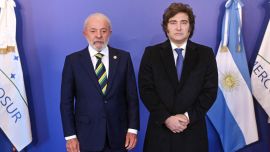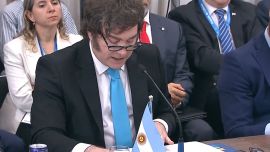President Alberto Fernández, in the name of the leftleaning Frente de Todos ruling Peronist coalition, is scheduled to deliver Argentina’s own version of the state-of-the-nation address tomorrow in Congress.
The speech will come on the first day of March. By the end of this new month, Argentina will have settled its renegotiation with debt bondholders, according to Economy Minister Martín Guzmán and President Fernández’s schedule. The deadline is March 31 – and so begins Guzmán’s long March.
The minister has engaged in a marathon of meetings with International Monetary Fund (IMF) officials and, presumably, bondholders in recent days. Last week, the IMF released a statement declaring Argentina’s debt “unsustainable”, but there have been more developments since then. Guzmán met with IMF chief Kristalina Georgieva in Saudi Arabia and then with the Fund’s technocrats in the United States. Guzmán also found time to shake hands with US Treasury Secretary Steve Mnuchin.
The meetings keep on coming. Jorge Arguello, Argentina’s new ambassador to the United States, held talks with US State Secretary Mike Pompeo. All this jawboning means that eventually, perhaps before the end of the year, Fernández will meet with US President Donald Trump.
Argentina’s president is trying to sort out the country’s debt problems politically. Still, in the end, it will all be about money – the success of the ‘gently does it’ approach hinges on the bondholders accepting a considerable haircut before the end of the month. The road has been long and winding for Fernández and Guzmán.
Argentina’s president embarked on a tour of Europe recently to explain the precarious debt situation to the leaders of France, Germany and Spain. Now the likes of Pompeo and Mnuchin are lending an ear to Argentina’s case. The novelty here is Guzmán’s approach: the minister is a US-trained debt expert who has chosen to mostly explain himself in writing. He speaks softly and has avoided any histrionics. The professor, while highly critical of austerity policies, is trying to speak in a language the world will understand. The debt is unpayable – even the IMF is telling you that – but don’t expect Guzmán to wildly declare a default with his hands up in the air. Still, a default is improbable but not impossible, to quote Argentina’s Central Bank head.
The IMF’s statement on Argentina’s debt is not the end of the road, far from it. Guzmán has since agreed to allow the Fund’s officials to monitor Argentina’s economy. A similar step was denied by late president Néstor Kirchner when he cancelled a US$10-billion debt with the Fund during his 2003- 2007 presidency. But the clock never stops ticking and now we are in the year 2020. (Once again: Argentina owes the IMF US$44 billion that the Fund injected during the 2015-2019 centre-right presidency of Mauricio Macri.)
Guzmán has ruled out deploying extreme austerity to meet the fiscal targets that would allow the country to immediately pay down debt, but the government’s recent decision to scrap index-linked pension hikes will effectively save it money, as favoured by the IMF. The government’s increases, by decree, have favoured retirees collecting the minimum pension, but those on higher pensions will lose out.
The government has also submitted a bill to Congress that would reform the special pensions enjoyed by the justice system (including judges) and the diplomatic service. A congressional battle is raging right now, with the centre-right opposition frowning at the changes. The reform could trigger the mass exodus of judges and prosecutors, as judicial officials rush to retire in a bid not to miss out on those special pensions. The new government had also promised a wider reform of the court system. The opposition claims that these reforms could allow the government to manipulate the courts, which have probed former Kirchnerite officials for corruption. President Fernández argues that it was Macri who manipulated the courts, with the help of the intelligence services, to frame those former officials in the first place.
Fernández is also expected to announce the increase of soybean export duties by three percent in his upcoming speech. The farmers are already fuming and some are calling for protests. Sound familiar? Cristina Fernández de Kirchner, when she was president in 2008, became locked in a epic, fierce standoff over export duties with the farmers. The increase was eventually quashed when the ruling party lost a Senate vote and the then-vice-president broke a tie against the government’s stance. But is the context different now?
Many could relate to the farmers, complaining about yet another tax increase back in 2008. But, again, the times have changed. The IMF has reportedly recommended jacking up the export duties too. Macri’s campaign promises when he won the presidency in 2015 included eventually scrapping the farm export duties all together, but he had problems delivering on his promise after an initial reduction.
Will the farmers manage to win the support of public opinion in the current context? It will be difficult for the farmers to go on the warpath against a government which has yet to register 100 days in office.
Increases are always on the horizon. For example, the new government’s credibility will be dented if it does not manage to curb inflation, even if it does manage to get some joy on the debt front by March 31. Recently, President Fernández was forced to overrule his own Cabinet chief, who had announced utility rate hikes would be unfrozen for some sectors in June.
Trouble keeps on popping up. The president was forced to apologise in public this week, when some human rights leaders criticised comments he made about “turning the page” on Argentina’s dictatorship years, saying they amounted to “negating” the atrocities committed by it.
Everyone, it seems, has to tread carefully. A long month lies
ahead.related news



















Comments